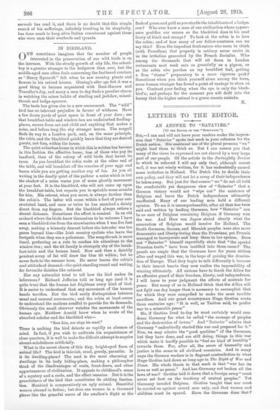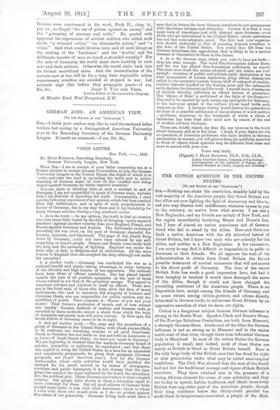LETTERS TO THE EDITOR.
AN ANSWER TO "BATAVIER."
r To THE EDITOR, OF THE " SPECTATOR.n can and will not leave your readers under the impres- sion that " Batavier" spoke last week in your columns for the Dutch nation. His continual use of the plural pronoun "we" might lead them to think so. But I can assure you that many of the views be expressed are not shared by a very large part of our people. Of the article in the Fortnightly Review to which he referred I will say only that, although meant, well, it was not wisely written, for it has undoubtedly caused some irritation in Holland. The Dutch like to decide their own policy, and they will not let a scrap of their independence be taken away. But just for that reason" we" do not all hold the comfortable yet dangerous view of "Batavier " that a German victory would not "wipe out" the existence of Belgium and leave the Dutch independence ultimately unaffected. Many of our leading men hold a different opinion. To me it is incomprehensible, after all that has been said and written by leading Germans, bow " Batavier " can be so sure of Belgium remaining Belgium if Germany won the war. And Herr von Jagow stated clearly what the annexation of Belgium would involve for Holland.. The. Smith Germans, Saxons, and Rhenish peoples were also more democratic and liberty-loving than the Prussians, yet Prussia managed to incorporate and keep them in her system. Does not " Batavier" himself regretfully state that "the special Prussian traits" have been instilled into those races ? The proofs are ample that the Germans have for years striven after and waged this war, in the hope of gaining the domina- tion of Europe. That they begin to talk differently is because in their inmost hearts they now realize the impossibility of winning ultimately. All nations have to thank the Allies for an effective guard of their freedom, liberty, and independence. I will leave to your judgment the efforts of neutrals for peace. But many of us in Holland think that the Allies will not fight one day longer than is necessary to accomplish that for which they were compelled to make the most terrible sacrifices. And our great countryman Hugo Croatia wrote three centuries ago: "It is well, as Tacitus said, to prefer war to a miserable peace."
Sir, if Grotius lived to-day he most. certainly would con- demn. Germany for what he called "the carnage of peoples and the destruction of towns." And "Batavier " admits that Germany "undoubtedly started this war and prepared for it." Now, we may admire the "good qualities" of the Germans, but they have done, and are still doing, things in this war which make it hardly possible to "feel no kind of hostility" towards them. For, after all, the sense of humanity and justice is the same in all civilized countries. And in many ways the German warfare is in flagrant contradiction to what Hugo Grotius laid down so long ago in The Right of War and Peace. His' whole thesis in that work is that "war has ita laws as well as peace." And has Germany not broken all the laws of war? Grotius laid it down that a foreign army" must never set foot on the territory of neutral peoples." Yet. Germany invaded Belgium. Grotius taught that war must be carried on against armed men only, and that women and children must be spared.. Have the Germans doze that ?' G rotius even condemned in his work, Book II., chap. iv., par. x v., as illegal "the use of poison against an enemy," and the "poisoning of streams and wells." He quoted with approval the expressions of ancient authors who called such deeds "a criminal action," "an abominable action," and "a crime." And what would Grotius have said of such things as the sinking of the Lusitania' and the 'Arabic,' and the deliberate murder of men on board a stranded warship P For the sake of humanity the world must show hostility to such acts and their authors. Otherwise the world sinks back into its former uncivilized state. And the reconciliation of the nations now at war will be for a long time impossible unless unnecessary cruelties are avoided or stopped in war. Let neutrals urge that before they propagate peace.—I am, Sir, Sz.c., JOHN C. VA.N DEE TEEE, Loudon Editor of the Amsterdam Telegragf,
49 Minster Road, West Hampstead, N. W.



































 Previous page
Previous page